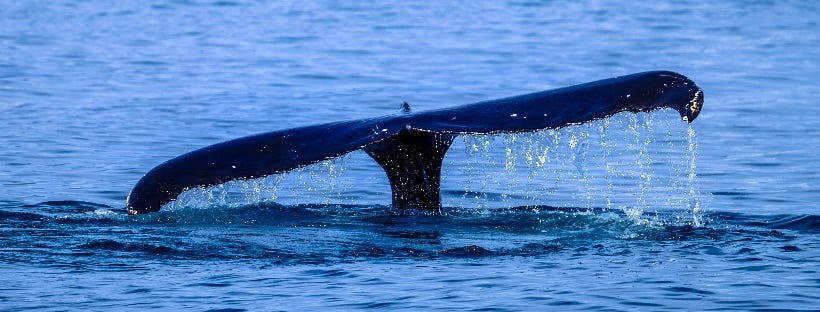The sad story of two lost whales in London and the Mediterranean
Two whales lost their way and their family this week; climate change and human activities in the oceans are likely to blame.
One of the stories that I followed in the media today was the whale in London's River Thames. There was never much hope that it would make it back to the sea and its family. During the day, news flashes slowly prepared us for a sad ending. In the afternoon, I learned that the condition of the minke whale calf deteriorated when it became stuck for a second time. It was suffering badly, had no or little access to nutrition, and there was no hope for its survival. The rescuers decided to put the whale down.
Northern minke whales typically live in the North Atlantic and average about 7 or 8 meters in length. Until recently, experts thought they were the smallest baleen whale; but then a smaller species that they considered being extinct, the pygmy right whale, was rediscovered in 2012.
Experts can only speculate how this minke whale calf ended up in Richmond, hundreds of miles from the estuary of the Thames in the North Sea. It could have been ill or injured. It could also be another example of a whale getting into trouble because of human interference in their habitat. Whales sometimes get hit by vessels at sea, or they get injured or drown in fishing nets. Loud underwater noise from all kinds of activities like seismic surveys for oil or gas can disorient them and drive them off course.
Whales in the Pacific Ocean
Some of these causes are similar to those that bring whales in the Pacific Ocean near California into trouble. Ship strikes have been identified several times as the cause of some deaths of gray whales, and these are the biggest threat to the survival of the endangered fin whales along the west coast of the US. They also have to deal with loud underwater noises, chemical pollution, and entanglement in fishing gear.
The sad story of the London whale follows only days after a young grey whale got even much farther away from its natural habitat in the Pacific Ocean. It somehow had found its way into the Mediterranean, desperately seeking its way back to its family thousands of miles away. Biologists think that climate change may have played a role. The warming of the Arctic waters, the melting of ice, and changing of the currents in the oceans may all have played a role in the young whale getting lost and taking the nowadays accessible northern route to the Arctic.
Wally
The good news is that this young grey whale, known as Wally, is swimming in the right direction again, towards Gibraltar. But it is undernourished and has already once been caught in fishing nets south of France. The heavy shipping traffic in the Gibraltar Strait will form another obstacle on its way back to the Atlantic. I didn't hear any news about Wally anymore in the past two or three days. It is only the second time that people saw a grey whale entering the Mediterranean; the first time was in 2010.
You can see Wally in this 80 seconds Reuters video.
Climate change is also the likely cause of a pretty spectacular change in the behavior of the Bering-Chukchi-Beaufort (BCB) population of bowhead whales. In the winter of 2018-2019, they decided to skip their annual migration to the south; usually, a clockwork migration pattern of 6000 kilometers (3,700 miles), where they swim every winter from the Beaufort Sea to the west and then turn south into the Bering Strait between Alaska and Russia.
Ecosystem shifts in the warming oceans
It is just one more example of ecosystem shifts that are already happening in the oceans. It is just the beginning of a highly complex change that will pose new challenges for many species and some opportunities for other species. I wrote earlier about the marine species fleeing the equator in this article.
Notes:
https://www.reuters.com/world/uk/minke-whale-calf-refloated-london-life-hangs-balance-2021-05-10/
https://theplanet.substack.com/p/the-largest-living-structure-on-earth
https://www.france24.com/en/live-news/20210420-a-whale-chorus-reveals-how-climate-change-may-be-shifting-migration
Whale tail photo by Francesco Ungaro from Pexels







Whale are such beautiful animals. I had completely missed that story about the whale in the London estuary. I've just read up on it. It's so sad to see that whales are struggling. Oceans clearly need our help to recover from what we've done to them.
Shortly before the pandemic hit I went to see a multimedia show called "Leidenschaft Ozean" (which might translate to "passion for the ocean" or sth). That was eye-opening and sobering. And, it was completely sold out - in land-locked Switzerland. People are (or were at the time) starting to take an interest in our oceans.
Thank you for highlighting the issues ocean wildlife and the oceans themselves are facing. Let's now elect leaders that will act.
Thank you
The whales seem to be under attack from all sides such as ship strikes, fishing gear, and climate change. Right whales are endangered and these hazards are making it even more difficult for the species to survive. The harm that humans have inflicted on wildlife, forests and plants, and the land is devastating. May humans wake up and finally realize that all life is interconnected. Your story is an important one to read and think about.